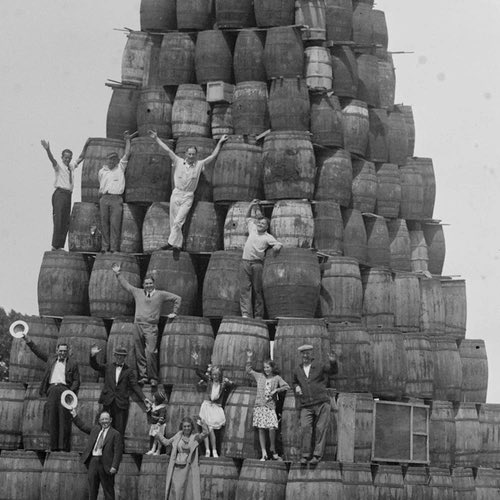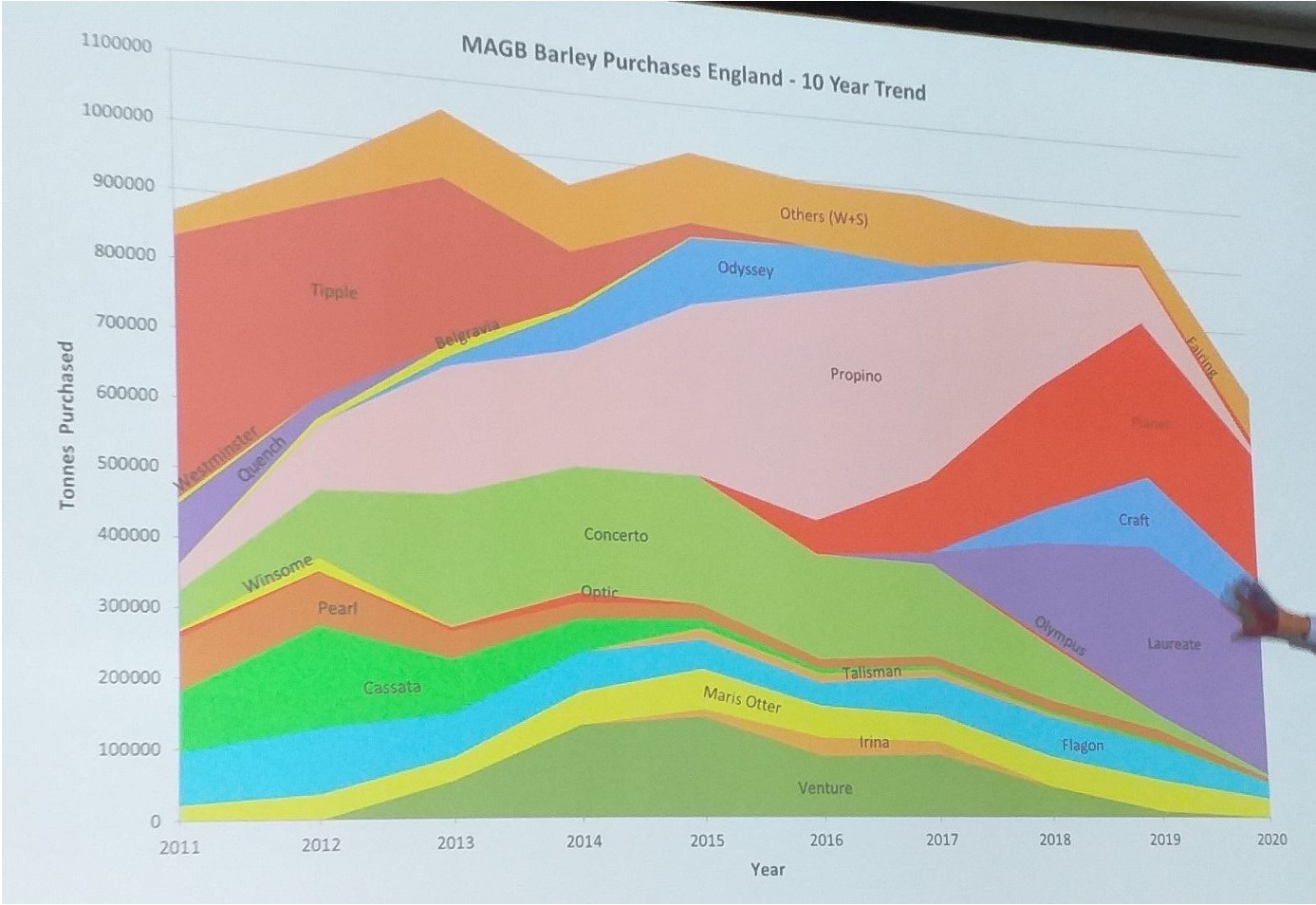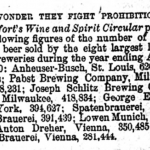 A nautical theme this week. Or at least one at the outset that will soon wander away, off on its own, finding another purpose in life. It is dead out there. But you know what they say: no news is beer news. Beer is good like that. It’s the people related to beer that get in the way. Things got fully into or out of swing with the Fourth of July, remembered by Ottawa historian Andrew King in his description of bonfires made of old barrels… perhaps even boozy barrels… ka… boomski!
A nautical theme this week. Or at least one at the outset that will soon wander away, off on its own, finding another purpose in life. It is dead out there. But you know what they say: no news is beer news. Beer is good like that. It’s the people related to beer that get in the way. Things got fully into or out of swing with the Fourth of July, remembered by Ottawa historian Andrew King in his description of bonfires made of old barrels… perhaps even boozy barrels… ka… boomski!
First off, the way of the world. One beer blog dies as another is revived with the publication of “News in Brief #62” at Seeing the Lizards including an analysis of a recent botch mentioned a few weeks back:
“You just have to look at history.” pontificated dubious scholar Sophie Aubergine-Pickle “They just got a handful of whatever grain they quite literally had to hand, threw it in some water. And left it.” “It stands to reason, doesn’t it? The human hand has all kinds of stuff on it. Bacteria. Wild yeast. Skin flakes. That stuff beneath your fingernails. If you leave it long enough, of course fermentation will spontaneously commence. And people back then would drink anything.”
Entirely conversely, I really liked this piece at GBH by Jamaal Lemon on the Charleston Schützenfest – a post US Civil War meeting space with beer and rifles, the sort of thing that developed in NYC a decade earlier in the mid-1850s. The story carries the combo of lived experience and scholarship that is too often lacking in these days. It also avoids another problem – the suspect helpful hand of the privileged. Since #BLM, #MeToo and even back to #Occupy we see too much of what we used to call the good South African Liberal* efforts to speak in support turning into taking on a heavy role in defining then steering the discourse. An allegedly helpful listing here gathered by those not on the list, a intervening pasty editor there. None of that in this piece – as it ought to be:
The beneficiaries of Charleston’s antebellum society have long manipulated virtually all local industries for generational gain, in an effort to maintain that established hierarchy. Just as it could happen in high school athletics, so it could in the local brewing industry, whose skewed diversity statistics serve as a testament to that longstanding inequity. This isn’t anything new: Systems of oppression constructed during Charlestown’s slave era were disrupted at the end of the Civil War, only to be violently reintroduced after the collapse of Reconstruction.
As you know, I have a very soft spot in my heart for brother Stonch but through these last few months he has done us all a service by sharing experience of being a pub owner during this pandemic with an independent eye, as in this tweet:
Our Ellie often spouts some absolute jarg lyrics, but I agree with her here. There’s danger of hospitality looking looking like, as my friend @jwestjourno put it, “the catering wing of the covid-denier corps”… Also, the problems of hospitality staff having to self-isolate after contact with infected – already crippling the industry (or even worse, becoming ill) – is only going to get worse without any degree of social distancing or mask wearing being adhered to in the workplace.
Excellent points. And remember this, too, next time you read some stumbling voice tell you his or her idea is too “nuanced” for Twitter. That’s just the hymn of the illiterati.
Some people have a blog on the side, about a bit of bun.
Boak and Bailey published an interesting post, sensibly and practically describing their thoughts on the success of Camden Town Brewery’s Hell lager. And, as we see often, received some feedback antagonistic to diverting off the single path of craft-thought or, in the German, KrafphtÜberlegen:
Helles means ‘light’. Beers badged as such tend to be very pale, light-bodied and with relatively low alcohol content. It’s got broad commercial appeal, as Camden Hells has proved, because that basically describes most mainstream lagers. Calling your lager a Helles is a great way to have your cake and eat it: it’s simultaneously (a) a normal, non-scary lager that people will actually want to drink and (b) a craft beer with heritage worth an extra pound a pint.
Apparently “helles” (like every word ever) has a variety of related meanings and (like every word ever) slightly different usages and different degrees of usage in slightly different contexts and cultures so be prepared for the wisdom of the self-certified in the comments. Yawn.
A PSA: if you see bad behaviour, call out bad behaviour. Whether it is bigotry or unfair employment standards or dangerous quality control only bad practices at breweries are assisted by saying “…[t]he responsibility to the consumer lies directly with them…” Nope. If you hold yourself out as a knowledge holder, withholding information is on you.
A fabulous story about a fabulous bar:
My dad said we could do something special for my 6th birthday. ‘Anything you want,’ he told me. I think he thought I was going to say ‘ice cream.’ But I said I wanted to go to New York City, and two weeks later we were on a plane. We spent the morning of my birthday shopping…
 Here’s an interesting story in the Daily Mail about the late Eric Tucker, a pub man who painted what he saw:
Here’s an interesting story in the Daily Mail about the late Eric Tucker, a pub man who painted what he saw:
Most of the pictures feature Lowry-type scenes from smoky pubs, tumbledown terraced streets and factories and showing flat capped locals with their wives… Now the former professional boxer – whose paintings were rejected by the art establishment while he was alive – is finally to have his talent celebrated after the unexpected discovery led critics to laud him as ‘the secret Lowry’.
Finally, frankly a sad bit of apologia found at The Glass, describing the natural state of beer judging due to the ridiculous macho requirement that beer judges not spit unlike wine, spirits, tea and every other taster of fluids:
Of course that’s not the same as drinking that many beers in a day. A judge might take just a handful of small mouthfuls in the course of assessing a beer. But still, you have to swallow in order to get the aftertaste, unlike wine and spirits where you spit. At the end of the day you’re not drunk, but I certainly wouldn’t want to drive. And there’s an element of having drunk… that weariness and woolliness that can creep in after a spot of day-drinking.
Note: you’re drunk.
That’s all for this week. For more, don’t forget to check out those weekly updates from Boak and Bailey mostly every Saturday, plus more with the weekly Beer Ladies Podcast, at the weekly OCBG Podcast on Tuesday (a particularly good one this week) and sometimes on a Friday posts at The Fizz as well. There is a monthly sort of round up at The Glass. There is more from the DaftAboutCraft podcast, too. And the Beervana podcast. And sign up for Katie’s weekly newsletter, The Gulp, too. And check out the Atlantic Canada Beer Blog‘s weekly roundup. Plus follow the venerable Full Pint podcast. And Fermentation Radio with Emma Inch. There’s the AfroBeerChick podcast as well! And also look at Brewsround and Cabin Fever. And Ben has his own podcast, Beer and Badword – when he isn’t in hiatus as at the mo, more like timeout for rudeness. And remember BeerEdge, too, where this week they ask the question if Sam Calgione is the dullest man in beer – and they get an answer. Plus a newcomer located by B+B: The Moon Under Water.
*Related to some so don’t bother…















